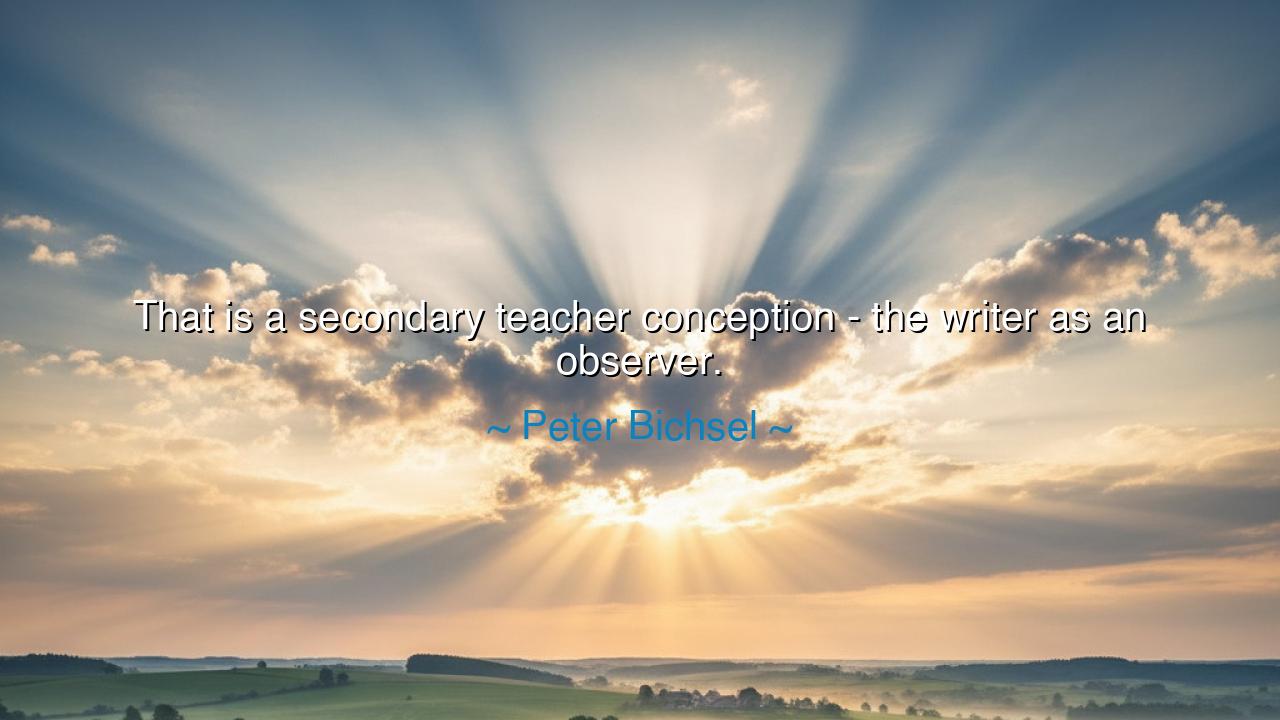
That is a secondary teacher conception - the writer as an






Peter Bichsel once reflected with sharp simplicity: “That is a secondary teacher conception—the writer as an observer.” These words speak to the ancient debate about the role of the one who wields the pen: is the writer a mere watcher of life, recording what passes, or something greater—a participant, a shaper, a voice that does not simply observe but gives meaning to what is seen? In Bichsel’s critique, to reduce the writer to an observer alone is to diminish the deeper power of writing. It is to mistake the shadow for the flame, the echo for the voice.
The meaning of this quote rests in the distinction between passivity and creativity. A teacher, in simplifying for students, may describe the writer as a mirror held up to the world, a neutral onlooker describing events as they unfold. Yet Bichsel calls this a “secondary” conception—useful perhaps in classrooms, but not the essence of the craft. For the writer is not only one who sees but one who interprets, who chooses which details to raise, which truths to unveil, and which silences to break. Observation is a tool, but it is not the calling.
The origin of these words lies in Bichsel’s life as both a writer and a teacher himself, steeped in the traditions of Swiss literature. He knew the temptation to reduce the art of writing to its simplest form for the sake of instruction. But he also knew that writing is more than report—it is transformation. By naming the idea of “writer as observer” as secondary, he pointed beyond it to the higher vocation: the writer as interpreter of human nature, as guide to the invisible currents of thought and emotion.
History offers examples of this truth. Consider Leo Tolstoy, who did not merely observe Russian society but laid bare its soul. In War and Peace and Anna Karenina, his words transcend observation; they interpret history, morality, and the restless yearning of the human heart. Or George Orwell, who observed the cruelty of totalitarianism, but went further—he transformed his observations into warnings that continue to shape political thought across generations. These figures show us that the greatness of the writer lies not in seeing alone, but in giving vision to others.
Yet, Bichsel’s words also caution us. Observation without engagement is a form of safety, a retreat into distance. The writer who merely observes risks becoming detached, voiceless, irrelevant. True writing demands risk—the risk of interpretation, of judgment, of standing for meaning in a world that prefers the neutrality of silence. To be a writer is to step into the storm, to name what others ignore, to shape not just what is seen but what is understood.
The lesson, then, is for all who write or speak: do not settle for being a mirror alone. Be a lamp, be a voice, be a guide. Observation is necessary, but it must be paired with courage. When you write, ask not only “What do I see?” but also “What truth must I reveal?” In this, the writer fulfills their higher purpose—not just reporting the world, but awakening the hearts of those who dwell within it.
Practically, this means cultivating both attentiveness and interpretation. Train your eyes to see details others overlook, but train your soul to wrestle with what those details mean. Keep a journal, yes, but also write essays, poems, and stories that risk declaring a vision. Do not hide behind neutrality when justice calls for truth, nor behind detachment when beauty calls for awe. Be more than observer; be participant in the eternal dialogue of humanity.
So let Bichsel’s teaching be carried forward: the conception of the writer as observer may serve as a beginning, but it is not the end. The true writer is a builder of meaning, a bearer of vision, a transformer of what is seen into what is understood. To write is not only to watch, but to awaken.






AAdministratorAdministrator
Welcome, honored guests. Please leave a comment, we will respond soon